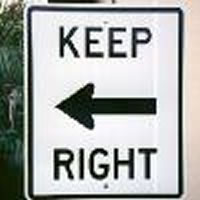The Lovely Bones — book review
 This is a crime thriller, a psychological drama and a fantasy woven into a fascinating texture set in suburban America circa 1973. It combines violence, sexual passion and the agony of grief that ultimately becomes reconciliation. As a novel, it depends for its existence on a trope of magical realism, but running counter to this is a harsh, factual evocation of violence and suffering. Susie, the protagonist-narrator is dead. She has been raped, then brutally murdered. So she tells her story in flash-back from a celestial perspective, and the mechanism works surprisingly well. The omniscient view of Mr Bradley, the repulsive, sleazy murderer is made shockingly graphic when viewed from a very conventional child's heaven.
This is a crime thriller, a psychological drama and a fantasy woven into a fascinating texture set in suburban America circa 1973. It combines violence, sexual passion and the agony of grief that ultimately becomes reconciliation. As a novel, it depends for its existence on a trope of magical realism, but running counter to this is a harsh, factual evocation of violence and suffering. Susie, the protagonist-narrator is dead. She has been raped, then brutally murdered. So she tells her story in flash-back from a celestial perspective, and the mechanism works surprisingly well. The omniscient view of Mr Bradley, the repulsive, sleazy murderer is made shockingly graphic when viewed from a very conventional child's heaven.
The same applies to Susie's grief stricken family and how they deal collectively and individually with her brutal murder over a six-year period. The only problem for me is Susie’s actual heaven with its 'gazebo' and 'swing set', although it serves its purpose sufficiently to be acceptable. Heaven is a construct, created from long-term earthly desires such as Susie's passion for dogs.
'Every day in my heaven tiny dogs and big dogs ... bassets tripped over their ears ... nudging the rumps of dachshunds, the ankles of greyhounds and the heads of the Pekingese.'
Not all the coherence of heaven with earth is wrought in this obvious (not to speak of canine!) mode. A child's drawing on the (earthly) fridge door with its naive blue line dividing sky from land is a more subtle device used to blend the two states of being.
Susie 'became convinced that the thick blue line was a real place - an Inbetween where heaven's horizon met Earth's. [She] wanted to go there into the cornflower blue of Crayola, the royal, the turquoise, the sky'.
The plot of The Lovely Bones rests on the growth and development of a grief stricken family. Initially they are atomised by their own various takes on their shock and loss. Mother Abigail absents herself emotionally and geographically for five years and finds superficial relief in anonymity. Sister Lindsay uses brittle denial whilst little brother and father cling to each other in blind confusion. Grandma becomes the heart of the family and the stabilising reference to sanity.
Meanwhile the plot is driven by the obsessive and at times dangerous attempt to flush out the villain. We know for certain that Mr Bradley is a serial killer. We watch every gruesome detail from the safety of Susie's heaven. We know where her body is hidden and we're treated to a spooky tour of Bradley's house that is not dissimilar to The Bates Motel. The fact that it's almost next door to Susie’s family home makes it all the more gruesome.
A satisfying order descends on chaos to bring a chastening resolution to this extraordinary novel. Sebold fires on multiple cylinders in an ambitious and successful attempt to demonstrate the healing power of grief. Humour, charm and human compassion are shown against the horrors of psychosis and destruction. She invites us on a fruitful if harrowing journey. Our only obligation is to suspend disbelief that there's a heaven up there. I'm an atheist and I managed it.
more MODERN FICTION reviews HERE
Tagged — The Lovely Bones; Alice Sebold; Fiction Review

 I think I know why. The 'Disgusted' of The Ignorant Party are showing their true colours. That is, they've never had the job of encouraging youngsters to write anything. What's more, these people all went to grammar schools thirty or forty years ago, where writing was not only de rigeur as an ethos but actually carried out from morning til night by literate youngsters. What do The Ignorant Party know about the other ninety per cent who went to Secondary Modern schools, where the subjunctive was about as well known as the Chinese alphabet and a subordinate clause was a distant relative of Father Christmas?
I think I know why. The 'Disgusted' of The Ignorant Party are showing their true colours. That is, they've never had the job of encouraging youngsters to write anything. What's more, these people all went to grammar schools thirty or forty years ago, where writing was not only de rigeur as an ethos but actually carried out from morning til night by literate youngsters. What do The Ignorant Party know about the other ninety per cent who went to Secondary Modern schools, where the subjunctive was about as well known as the Chinese alphabet and a subordinate clause was a distant relative of Father Christmas? 
